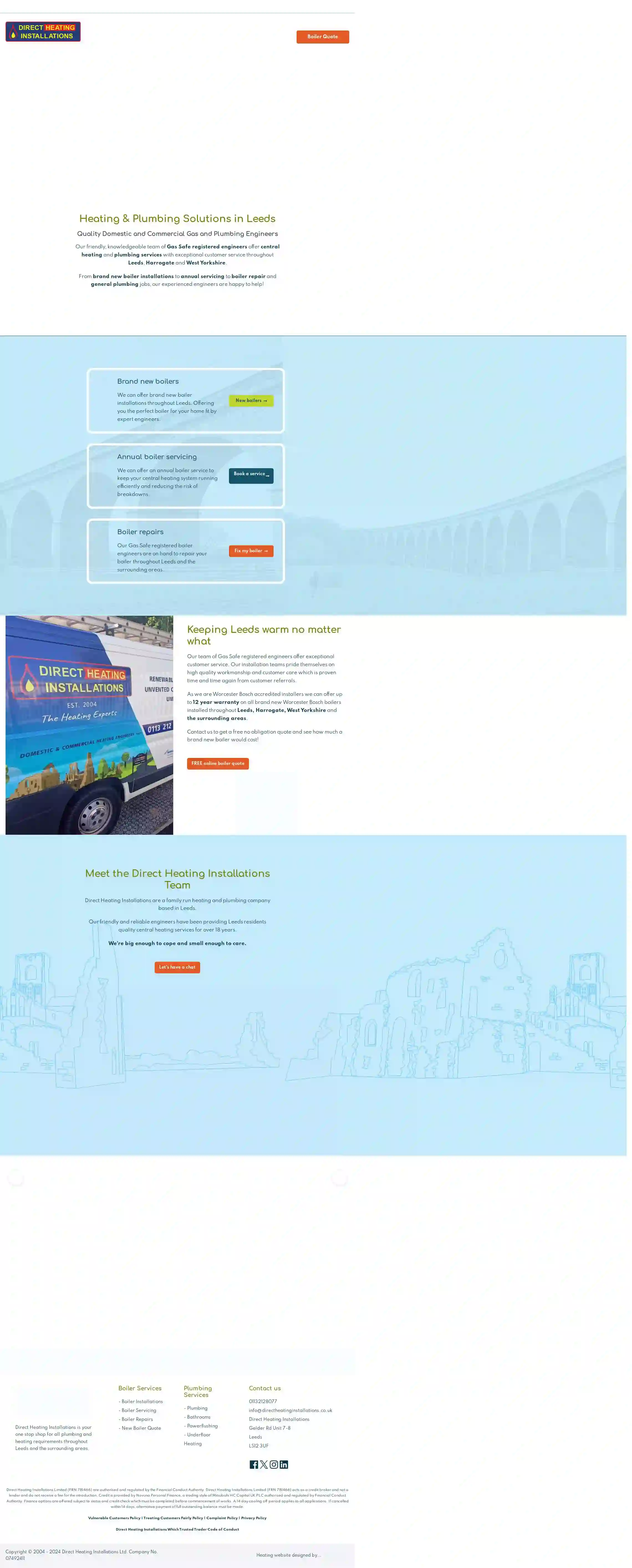AC Repair Leeds
Best AC Repair in Leeds
Get multiple Air Conditioner Repair quotes for your project today! Compare profiles, reviews, accreditations, portfolio, etc... and choose the best deal.

Direct Heating Installations
4.939 reviewsGelder Rd Unit 7-8, Leeds, LS12 3UF, GBDirect Heating Installations is a family-run heating and plumbing company based in Leeds, serving the Leeds, Harrogate, and West Yorkshire areas. With over 18 years of experience, their friendly and reliable Gas Safe registered engineers provide quality central heating services. They pride themselves on high-quality workmanship and customer care, as evidenced by numerous customer referrals. As Worcester Bosch accredited installers, they offer up to a 12-year warranty on new Worcester Bosch boilers. Direct Heating Installations offers a comprehensive range of services, including boiler installations, servicing, repairs, new boiler quotes, plumbing, bathrooms, powerflushing, and underfloor heating.
- Services
- Why Us?
- Accreditations
- Gallery
Get Quote- hv
hvac design+
1Leeds, GB- Services
- Why Us?
Get Quote 
Your Boiler Experts
4.967 reviews2 North View, Rothwell, LS26 0BQ, GBYour Boiler Experts is a reliable boiler installation, repair, and servicing company based in Leeds and Wakefield. Our team of experienced and qualified gas safe engineers are dedicated to providing top-notch services to ensure your home is warm and comfortable. With a 12-year warranty on our new boilers, you can rest assured that your boiler is in good hands. We offer a range of services, including boiler repair, boiler servicing, and new boiler installation. Our team is committed to providing fast, efficient, and friendly services to our customers. We use only high-quality and durable parts from reputable brands such as Worcester, Ideal, Viessman, and Baxi. Our services are designed to meet the needs of our customers, and we strive to provide the best possible experience. Contact us today to schedule your boiler service or repair.
- Services
- Why Us?
- Accreditations
- Our Team
- Testimonials
- Gallery
Get Quote- Un
Universal Air Conditioning Ltd
1Leeds, GB- Services
- Why Us?
Get Quote - No
North East Heating Solutions Ltd
4.813 reviewsLeeds, GB- Services
- Why Us?
Get Quote - TF
TF Solutions Ltd, Leeds
53 reviewsLeeds, GB- Services
- Why Us?
Get Quote - Li
Lion Heating (Leeds) Ltd
54 reviewsLeeds, GB- Services
- Why Us?
Get Quote - Tr
Trevor Gill Gas Installations
4.835 reviewsLeeds, GB- Services
- Why Us?
Get Quote - Le
Leeds Ventilation Ltd
1Leeds, GB- Services
- Why Us?
Get Quote - Cl
Climatair
1Leeds, GB- Services
- Why Us?
Get Quote
Over 16,895+ HVAC Contractors registered
Our HVAC pros operate in Leeds and surroundings!
HVACCompaniesHub has curated and vetted the Best HVAC Businesses arround Leeds. Find the most trustworthy contractor today.
Frequently Asked Questions About AC Repair
- Warm Air from Vents: Instead of cool air, your vents are blowing warm or room-temperature air.
- Insufficient Cooling: The AC is running, but your space isn't cooling down sufficiently.
- Unusual Noises: Squealing, grinding, banging, or other odd sounds are often signs of mechanical issues.
- Strange Smells: Burning odors, musty smells, or other unusual odors indicate potential problems like electrical issues or mold growth.
- Leaking Water: Water leaks around the indoor unit can indicate a clogged drain line or other drainage problems.
- High Energy Bills: A sudden increase in your energy bills might be due to a struggling or inefficient AC unit.
- Short Cycling: The AC unit turns on and off frequently, without completing a full cooling cycle.
- Regular maintenance: Keep up with regular checkups and maintenance to keep your system in peak condition.
- Programmable thermostat: Optimize temperature settings based on your schedule and occupancy.
- Seal air leaks: Reduce drafts by sealing gaps around windows and doors.
- Adequate insulation: Ensure proper insulation to minimize heat gain and loss.
- Strategic landscaping: Plant trees or shrubs to shade your home from direct sunlight.
- Ventilation: Improve ventilation to remove excess heat and humidity, reducing reliance on AC.
- Energy-efficient windows: Upgrade to double-paned or energy-efficient windows to keep heat out during hot spells.
- Regularly clean/replace air filters: A clean filter optimizes airflow and efficiency.
- Consider upgrading your unit: Older models are usually far less efficient. . If your unit is over 10 years old, consider replacing it with a high-efficiency model.
What is the difference between a central AC and a heat pump?
Can a dirty air filter cause my AC to freeze up?
How do I know if my AC needs repair?
How can I make my AC more energy-efficient?
What is the difference between a central AC and a heat pump?
Can a dirty air filter cause my AC to freeze up?
How do I know if my AC needs repair?
- Warm Air from Vents: Instead of cool air, your vents are blowing warm or room-temperature air.
- Insufficient Cooling: The AC is running, but your space isn't cooling down sufficiently.
- Unusual Noises: Squealing, grinding, banging, or other odd sounds are often signs of mechanical issues.
- Strange Smells: Burning odors, musty smells, or other unusual odors indicate potential problems like electrical issues or mold growth.
- Leaking Water: Water leaks around the indoor unit can indicate a clogged drain line or other drainage problems.
- High Energy Bills: A sudden increase in your energy bills might be due to a struggling or inefficient AC unit.
- Short Cycling: The AC unit turns on and off frequently, without completing a full cooling cycle.
How can I make my AC more energy-efficient?
- Regular maintenance: Schedule annual or biannual professional tune-ups to keep your system in peak condition.
- Programmable thermostat: Optimize temperature settings based on your schedule and occupancy.
- Seal air leaks: Reduce drafts by sealing gaps around windows and doors.
- Adequate insulation: Ensure proper insulation to minimize heat gain and loss.
- Strategic landscaping: Plant trees or shrubs to shade your home from direct sunlight.
- Ventilation: Improve ventilation to remove excess heat and humidity, reducing reliance on AC.
- Energy-efficient windows: Install double glazing to minimize heat transfer.
- Regularly clean/replace air filters: A clean filter optimizes airflow and efficiency.
- Consider upgrading your unit: Modern AC units offer significantly higher SEER ratings. If your unit is over 10 years old, consider replacing it with a high-efficiency model.